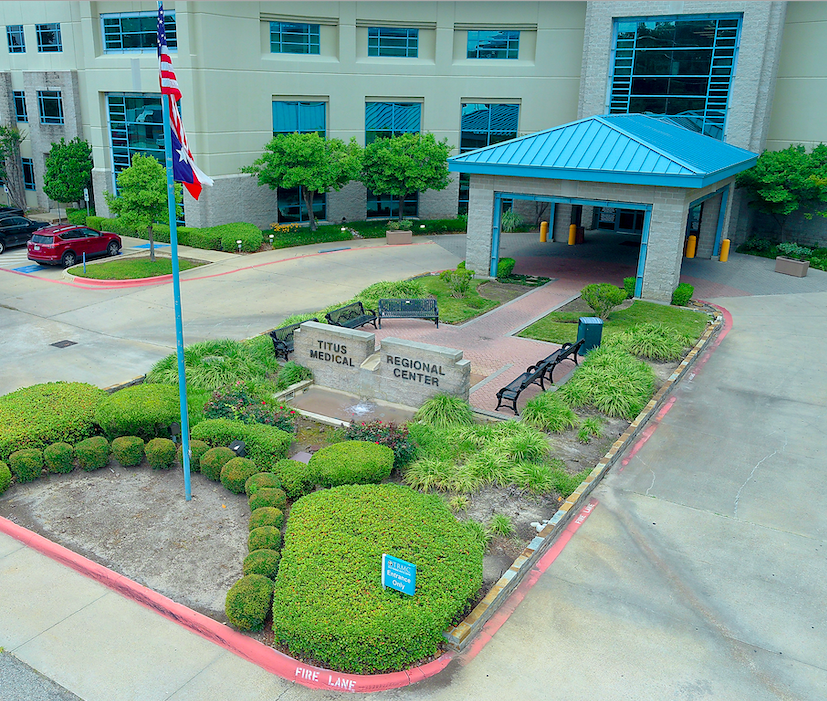Mount Pleasant, Texas, avoided the first wave of the COVID-19, but the hospital in town was ready when the virus arrived. The region went from 20 cases at the beginning of May to more than 700 over the next several weeks, pushing the healthcare system to the brink of exhaustion.
Mount Pleasant is 60 miles from Oklahoma, Louisiana, and Arkansas, and Titus Regional Medical Center is one of the few remaining independent rural hospitals in the region. Four hospitals have closed in the surrounding area over the past several years. Titus CEO Terry Scoggin has lived in the community since 2004, putting down roots in the city, and the outbreak was an unprecedented challenge for him.
In March, before there were many cases in the region, the hospital began following CDC guidelines in preparation for what could come. The staff began to research the disease and what the hospital could do to treat it and prevent the spread. “I think we have researched more information in the last 90 days than in the last five years,” Scoggin says.
Mount Pleasant was already seen as a vulnerable community for the pandemic, but for the first eight weeks there were almost no cases. The risk factors included a Pilgrim’s Pride meat packing plant in town, the high Medicare population, and the fact that 31 percent of adults in the area are uninsured. The first case didn’t arrive in town until April 1. “We have never worked harder with fewer patients,” Scoggin says.
A combination of the end of elective procedures and already thin margins at the rural hospital meant that Titus Regional had to furlough or eliminate 10 percent of the workforce, no easy task in a town where those 85 employees are also members of the same church or live in the same neighborhood. They consolidated clinics, and closed service lines prior to the outbreak.
On May 1, there were just 20 cases, but when the infection broke out in the chicken plant in the middle of May, the numbers picked up. 675 cases were confirmed over the next 45 days, a huge spike for a community of its size. Around 400 of the cases were connected to the chicken plant. At the peak, the hospital was forced to convert portions of the emergency department for COVID-19 patients and open up a floor of the hospital that had been closed since 2013 to treat the patients in isolation.
Over those 45 days, the hospital filled up with nearly two dozen hospitalized COVID-19 patients, a large number for a hospital with just 70 beds. In Dallas-Fort Worth, fewer than 15 percent of those in local hospitals have been COVID-19 patients, while in Mount Pleasant, that number was at 29 percent. “It stretched our organization about as much as it could,” Scoggin says.
Between mid-May and mid-June, the hospital was as busy as ever treating COVID-19, though by the end of June there were just two or three hospitalized with the virus. Fortunately, most of the cases needed minimal care, and Scoggin says there were just 5 fatalities with 760 confirmed cases, a mortality rate of less than one percent. Throughout that time, they didn’t need any extra staff, though resources were depleted. “We were concerned that we would might not have enough staff, but everyone worked together to accomplish our mission,” Scoggins says. “It was a couple of intense weeks but we didn’t break.”
Much of the outbreak was in the Hispanic community, where many worked for Pilgrim’s Pride. With multi-generational housing and a language barrier, Scoggin says he learned a great deal about public health in his community and where they can improve in reaching all cultures.
Scoggin says working with Carter BloodCare in Tyler and treating with convalescent plasma had a huge impact on the intensity of the virus, something many rural hospitals didn’t have in place. He also said some of the most critical patients who needed a ventilator were transported to Tyler and Dallas for treatment. They received and donated PPE as it was needed in different regions, working with other hospitals across the state. They eventually received a shipment of Remdesivir, which also improved treatment.
Throughout the outbreak, the hospital organized COVID-19 huddles to make group decisions about patients, and organized town halls for community leaders about best practices and ways to prevent the spread of the disease. They worked with Pilgrim’s Pride, which remained open throughout the outbreak, and other major employers to give guidance where they could.
Scoggin says because most of the outbreak was connected to the meat packing plant and the Hispanic community that worked many of those jobs, much of the town still feels isolated from the disease, and social distancing and masks are not as prevalent as one my think in a town that experienced such an outbreak. Even though totals are decreasing in Mount Pleasant, Scoggin worries that the rise in cases in Dallas and Houston will eventually make it back to Titus County. The plant is still open, while most of the employees never came down with COVID-19 and may still be vulnerable.
Publicizing precautions has also led to some blowback from locals who are worried about what it might do to the economy. “Friends of mine are calling me and telling me how we are ruining the economy by supporting this,” he says. But he took the precautions seriously, not even visiting his own father when he was hospitalized just 100 yards from Scoggin’s office.
Overall, Scoggin is pleased with how his hospital and community responded. “I am very proud of the doctors and clinical team,” he says. “It is something that no one has seen before, and it was an impressive feat for a rural hospital to be able to pull off.”





